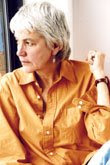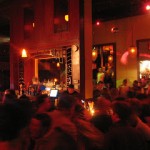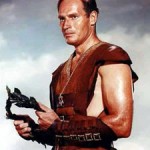Exclusive Interview: Cris Williamson Sings With SWC
By Miryam Gordon
The Seattle Women’s Chorus is about ready to jump out of their collective skins because they  are so excited about singing with Cris Williamson! The concerts are Sunday, April 6, 4pm in
are so excited about singing with Cris Williamson! The concerts are Sunday, April 6, 4pm in
Many members of the Seattle Women’s Chorus speak movingly about how they remember first hearing Cris Williamson’s music, particularly the Changer and the Changed album, in college, for instance, and how revelatory it was for them. They felt as if the album spoke directly to them.
But before the music, there was a young woman named Cris. How did she find her way to creating her art and what sustained her in that journey? I was able to ask the question to Cris, recently, as she prepares to sing with SWC.
Cris’s words:
The thing is I’ve  always been myself, because I have no facility for guile or acting. My story isn’t as interesting as people who have told me about listening in bars or dark corners. My coming out story is much simpler.
always been myself, because I have no facility for guile or acting. My story isn’t as interesting as people who have told me about listening in bars or dark corners. My coming out story is much simpler.
I was a hippie and it was free love and I dove into it like fresh water. Somebody had to actually tell me that it was thoroughly illegal for women to love women and I was honestly astounded. In my mind, I went where the leash was longer in Northern California and fell in with lesbians who were just (starting) to calling themselves that.
(What was the progression to
Growing up in
I had one boyfriend all the way through high school. It was convenient. I always had someone to go out with.
(Ages) 16 to 18, I made three albums of folk music and was in a rock and roll band in college and took voice lessons. Music was a huge part of my family, we sang a lot together.
I really didn’t have an attraction to women until long after college. I was in a rock and roll band with five guys; I was pretty much with men throughout college, or I was alone and interested in school, scholarship. I graduated college in
I started writing (songs) again in ‘69 and lived in a house with other people in
But I was very in that scene with a band, we’d play for political rallies. People could break all the rules. Revolution – the Beatles gave us permission to do it all musically (break the rules). I saw Hendricks live, the Doors, Janice Joplin. Most of whom didn’t live. I came through it and lived, but things were wild. They (the times) taught you a kind of iconoclastic behavior – we didn’t want to be icons, we broke ’em down as soon as they were made. Teaching English compared to that wasn’t very interesting. I tried things on to see what happened.
(People my age were deciding – just philosophically – to become bisexual, just to not leave half the world’s population “out.”)
I would honestly say I had that same philosophical approach. We experimented with all kinds of thing. There were women, I was with women, and I just ended up being with women from then on out. It interested me more, women were more complex, in ways I understood. So I was with women from then on out.
Women started coming to my shows. I eventually moved to
Basically, what I want to say is: it’s metaphorically wandering down a small path and coming to a clearing and there were all these women. It took me until I met up with the Furies in
Meg came up to me and asked what I thought of women’s music and I didn’t know what (that was). She asked every woman who came to D.C. She was the one who invented the genre and idea of women’s music. I was intrigued to know if, when women, in partnership with other lesbians, made music with a high level of consciousness, if there was something different about it. So, I listened to them and they listened to me.
Meg had found that album (put out by Ampex) and had decided that it was women’s music and had been singing songs from it in D.C. before she met me. By the time I played there, people already knew my music. I had a folk music gig in D.C. and they (Meg and friends) showed up. I’d never been there before and there they were applauding and knew about me. That’s the value of music. It’s portable and can get into the hands of other people. That’s what Ann (Bannon) did with her books and I’ve done with my music.
By the time I decided to do an(other) album, I had written enough material and that was ‘74-‘75. And I’d met the women who became Olivia – the idea of which I invented in an interview! I said, “Why don’t we become a women’s recording company?” And it became the first national all women’s recording company. Olivia was started, the (iconic album) The Changer (and the Changed) was made and we went on from there.
(Did you write music that was deliberately focused for lesbians?)
I wasn’t aiming for anybody; I write for myself. Like if you do a paper for the teacher as opposed to writing on the subject. I addressed the subject. Waterfall (arguably her most famous song) was about life specifically: sometimes it’s down, sometimes it’s raining, life has moods, just like classical music does. It isn’t always one thing. When you look at my music closely, it’s very short on pronouns, especially gender, because what interests me the most is the human condition. Waterfall doesn’t mention anyone. Shooting Star, neutral. I like to walk the middle of the road a lot, because I want to make sure as a writer that I address the universal. Why would this matter to anyone else in the world? “…it’s an endless waterfall” and my job is to pour music over everybody. So women heard it and we were just converging on that clearing all together. That time was defined by a great hunger and that hunger led people to sustenance: food, water, shelter. I think that’s what my music provides. Not just for women, but at that time women needed it the most. That great need to have that internal landscape described and cared about and found valuable. More women were out questing. And they found me. And claimed me for their own.
They would give my music to other people and you would go (to a person’s house) and know that house was gay-friendly, even though I didn’t set out to make gay-friendly or lesbian music. I set out to make good food, to make art that would sustain many people over a long period of time. So I say it is women’s music as well as human music. Woman’s music is contained within this music.
In the folk world, I wanted to be considered a good folk musician who also happened to be lesbian, but that got translated into a lesbian who was also good at music. I had to accept that. That was how my sisters needed me to be. I should fulfill that first. I don’t make lesbian music, but whether I set out to do it or not, it happened. Sometimes art does that. It happened in a natural way and it was really good for me as well.
You have to accept the truth of your life and the truth of other people’s lives who are gathered around you. Women needed a strong figure who was able to walk around saying, “I’m absolutely a lesbian.” I didn’t say “lesbian, lesbian, lesbian” all the time onstage. Sometimes, people criticized me for not saying it more. Even in a room where there were lesbians who knew I was a lesbian, people wanted it said. There was a need (to hear it). “You can be happy” from Song of the Soul. It was revolutionary in its way, women could be happy in this choice (to live as an ‘out’ lesbian). Once I made the choice to accept the priority, I had to accept that I was held as a cultural icon. I’m such an iconoclast. I never rested easily with an iconic value, because it’s iffy.
Now, 30 years later, when that album holds the value that it does, my art has taken on an iconic value. That’s pretty amazing. It has a life of its own, and that’s magnificent. If you live long enough, now “lesbian” can be said a 100 times a day and no one dies as a result! If I had anything to do with that – people tell me I did, so I will accept that – then that’s magnificent. And it’s gone beyond my poor artistic endeavor, trying to make something beautiful and lasting.
I’m struggling mightily to say to people who are repressed and depressed, that they can be happy in the world, that we love, that’s what makes us human beings and not chairs. That’s how you tell the difference. Between chairs and human beings. You’ve got to be brave to be a loving person in the world. You have to risk everything. I’ve risked putting out my art and it’s amazing having people love it so much.
(What was it like becoming a sex symbol to lesbians?)
In my youth, it was pretty sexy time, women were exploring sex symbols. I think women’s music became sexy. (Yes, becoming a sex symbol) it was there, it was fun, but that’s the essence of rock and roll. It can be very heady if you take it seriously. I didn’t take it that seriously, it was fun. It can get too personal. People think they know you, but they don’t. I had my share of stalkers, as well. It can be very uncomfortable. People feel terribly personal about you. Women would come on so strong, it would scare me to death. (MG: It was a time of women learning to take power.) Women’s power to say what they want. I gave it (power) back to them. My job as an artist is to give it back and empower women in particular.
(On this concert with the
What excites me is to see the love in their faces, it’s so wonderful, there’s love and devotion to my art. I feel like an artist and that’s good. I love choral music, I always have. It’s great to see these pieces that I imagined turned into choral pieces, that means that other people can do them, which means it continues the art, and I don’t have to be the only one who carries the art that way.
I’m looking forward to it, so much, and I hope it has long lasting repercussions, when we go to GALA, all of that. My hope is that people will come and hear the music and see that women have been making art all along, the art is not necessarily by women all the time, but the part of it that makes it unusual is that we’re talking about women’s lives and making life happy. Nothing you have to spin, it is what it is. Why is this music for everyone? It’s about all of us. “If you cut us, do we not bleed? (Shakespeare) The way we love and care is not unusual, but that we’re (lesbians) out and about in society and it’s talked about a lot more in society.
To have seen these kinds of changes in society, you got to stick around to watch the movie of your own life. People fall so deeply in love with music that came out of my heart, what are the odds? And that they took it so personally and it mattered so much to them. I made the music, but the women are the ones that claimed it and me. Like any artist, there’s a part that feels lost. Now, I feel a lot more found.
For more information about the concert, go to www.flyinghouse.org for ticket information, or call (206) 388-1400.














